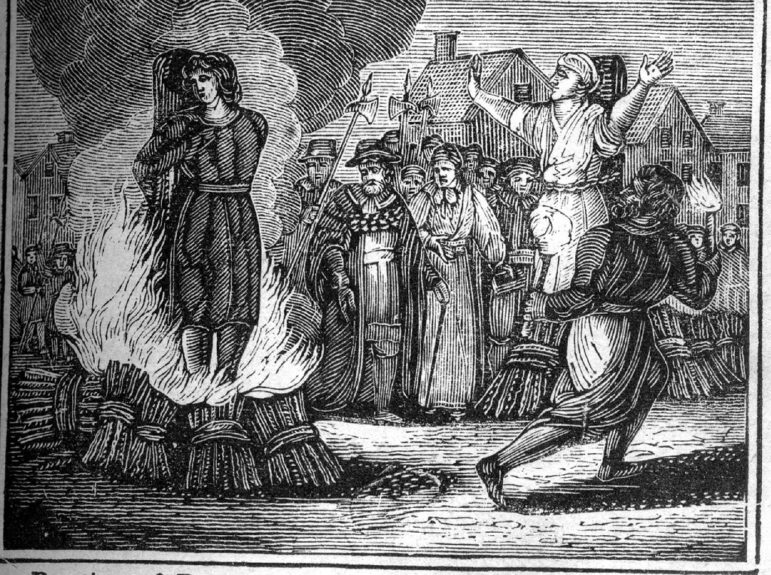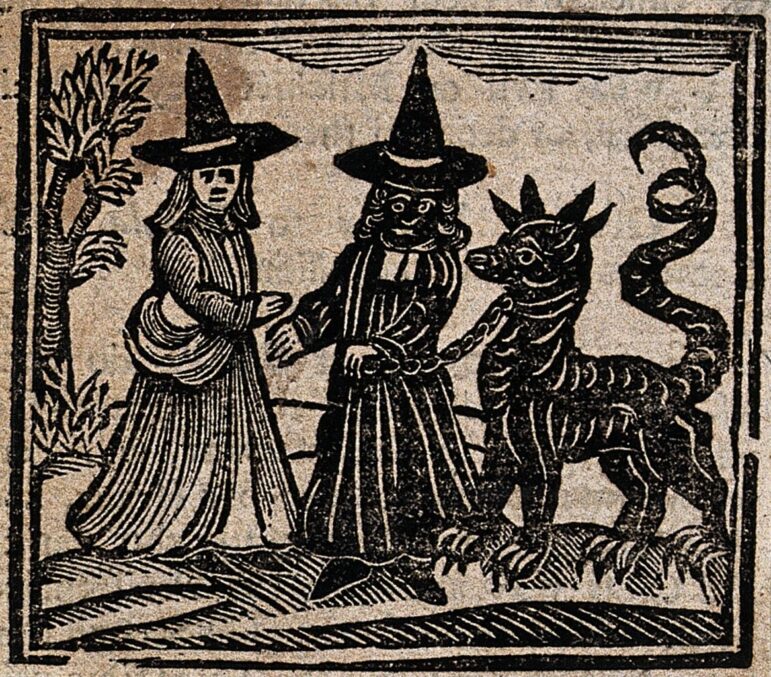
I believe that Witchcraft has always been queer.
In the realm of the historic, the witch was an outcast, shunned by civilized society as the antithesis of all for which the Church and State both stood. The witch was a figure of both disgust and fear, but, paradoxically, also of sexual desire and temptation. The witch represented that which was forbidden in all its forms. And for that, she was reviled, even as she titillated the minds of the repressed. Very queer, indeed.
When Wicca first emerged on the cultural scene, it expressed views seen as radical, even a threat to the Church and “polite society.” Not only was there the presence of a Goddess, but She was seen as having power over the God in a socio-political role reversal that shocked the puritanical masses and firmly established the religion as a bonafide counter-cultural phenomenon.

19th Century woodcut, artist unknown – Image credit: Robert Benner (Mullica), CC BY 2.0, https://commons.wikimedia.org/w/index.php?curid=15358452
Today, the term “queer” has taken on a more specific connotation, one of a particular sexual desire and agency. Because of this, it might be tempting to think of “queerness” as a wholly modern invention: a political movement meant to thumb its nose at the establishment and perhaps create a bit of disorder or chaos in the name of personal freedom and youthful transgression. A counterculture set squarely against the dominant paradigm of church, state, and what is generally conceived of as being “normal” or even “decent.” Now, when so many more young people identify as “queer” than ever before, it can seem like something new is happening, an emergent change in human sexuality and gender identity that can seem frightening to those who are wholly outside the phenomena.
An umbrella term used in modern times to mean any on the growing spectrum of sexual and gender identities, “queer” is a more approachable and convenient container for those more specifically identified as LGBTQQIP2SAA (Lesbian, Gay, Bisexual, Transgender, Queer, Questioning, Intersex, Pansexual, Two-Spirit, Asexual, Ally) or LGBTQ+ for short.
While the terminology might be new, the realities of the people involved are not. What in modern times has been identified as “queerness” has been recognized for thousands of years in various ways by different cultures.
There are many examples of this from many different cultures, facts that fly in the face of those who will insist that “there are only two genders” as they ignorantly misrepresent both the history and the science that say otherwise.
I included a few of these historical examples in my most recent book, The Satyr’s Kiss:
In many instances, queer men in antiquity were occupying these sacred roles and, in some cases, were even perceived as a third gender. One example from history would be the Galli. In the ancient worship of the mother-goddess Cybele, the Galli were a priesthood of men who had self-castrated to better serve their goddess. They would dress in the clothing and attire culturally seen as being for women and would otherwise present themselves in a manner incongruent with the gender to which they were assigned at birth. So too, did the Gala, the ancient Sumerian priests of Inanna. The Hijra of India and the Two-spirits of various Native American cultures likewise demonstrate a long tradition of sexual or gender-variant people occupying a sacred and spiritual role.
Today we see a rise in those identifying as transgender, but to assume this means a fundamental and abrupt change in human behavior is naïve, based on a cultural worldview that has been purposely designed to deny legitimacy to those who are different. It is an authoritarian colonial worldview and one that has unfortunately persisted.
In ancient eras, these people simply identified in whatever ways their particular cultures allowed, often simply as their gender-of-declaration or as something other than how we commonly view ‘male’ and ‘female’ genders today. In earlier times in the modern era, they have been much more likely to remain closeted, but make no mistake: they have still existed. They are not new, but modern society’s growing acceptance of them is.
But with any progressive move forward, there is always a regressive backlash.
Today in the United States, a staggering number of legislative bills have been introduced (and in some cases enacted into law) that seek to dehumanize and oppress trans people in the name of “protecting the children.” The most insidious of these are the laws that ban gender-affirming care for children, which incites the basest of our natures by implying that children are being harmed and that good people must stand up to protect them from a common enemy. This is the same argument that has been used for centuries against non-conforming people. Witches, gay people, and Jews were all accused at one time of “eating babies,” a charge which has only slightly been updated for the modern era. I’m almost a bit surprised that they don’t still accuse us of having horns.

Two witches meeting with a great beast in a woodcut from 1720 [public domain]
News flash: neither trans people, their doctors, nor drag queens are harming children. For that, one needs look no further than the men of the Catholic Church, which —in the San Francisco diocese alone— is defending against 500 child abuse lawsuits and, as a result, will likely file bankruptcy. 500 in San Francisco – San Francisco alone. Add to that… nearly every other diocese over two thousand years, and we have what I would call a clear and present danger to children all over the world. But sure, let’s attack parents and doctors and drag queens; it’s easier than confronting our own bigotry.
While Republicans claim to want the government out of people’s private lives, they sure are crafting a lot of legislation to the opposite effect. In Florida, more than 40% of parents surveyed expressed a wish to leave the state in the wake of that government’s “Don’t Say Gay” law, which bans all discussion of LGBTQ+ lives and identities in the classroom.
While many of us in the Craft have no love for Christianity and the oppressive systems it has historically supported, we find that old habits can still die hard. Wicca (in both its public and private forms) arguably represents the largest swathe of modern Pagans practicing today, with many more taking their cues from the system. Having both a goddess and a god, this cosmology seeks to provide a balance unattainable by the current mainstream religions focusing exclusively on the male. But as the years have progressed, so has our understanding of the world, and what once was a healthy dose of liberation can now be seen by some as unnecessarily limiting.
While the pairing of the goddess and the god might seem a balanced approach, it actually ignores a lot of what is happening in nature. An estimated 1-2% of the US population is born intersex, a fact that many people are unaware of. While this sounds small, that translates to roughly 4-7 million people. They are a natural part of our human family, and to expect them to fit into one of two arbitrary categories is both frustrating as well as harmful.
I think that if the Craft is to survive as the 21st century progresses, it needs to come to terms with its own participation in the oppression of queer people and offer real alternatives to the current “male/female” gender polarity trap. We need to move beyond the goddess and the god as the spiritual parents of humanity and recognize queer and trans, and intersex figures as well. We need to collectively lift up those who have been traditionally ignored or beaten down. Only then will we embrace the true magic known to our distant ancestors: the nebulous and changeable nature of spirit and our place within it.
The Wild Hunt is not responsible for links to external content.
To join a conversation on this post:
Visit our The Wild Hunt subreddit! Point your favorite browser to https://www.reddit.com/r/The_Wild_Hunt_News/, then click “JOIN”. Make sure to click the bell, too, to be notified of new articles posted to our subreddit.